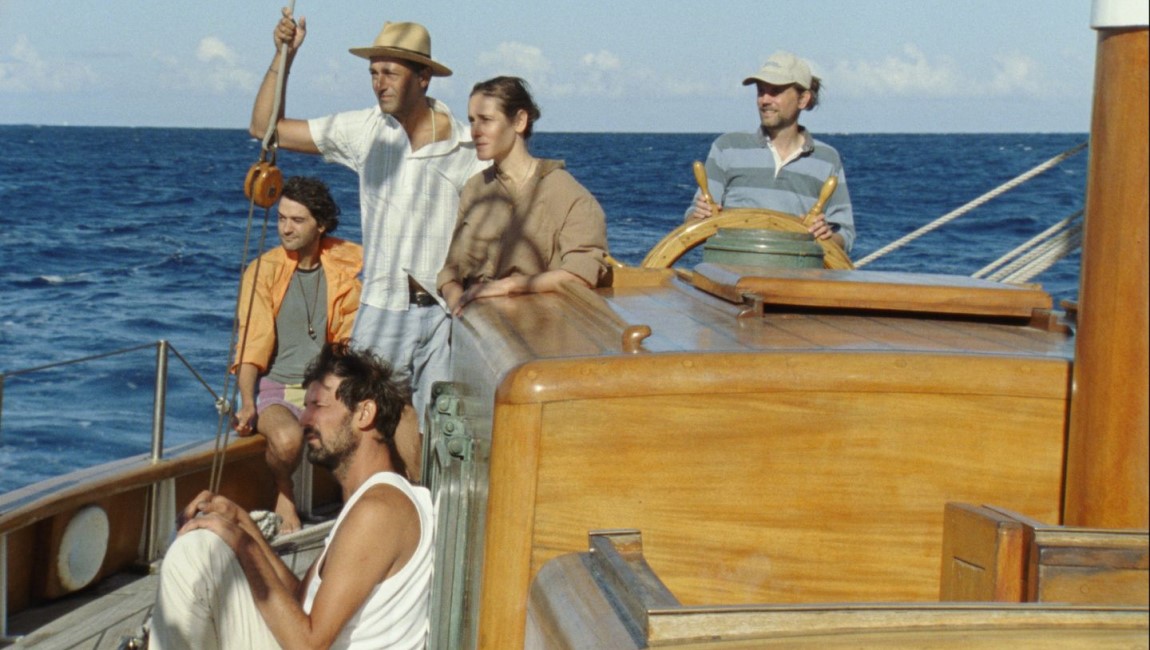Bouncing back from two years worth of Covid-related disruption while still riding out some major switch-ups and art direction, the Locarno Film Festival returned in 2022 with an international competition lineup more in keeping with the imagination and avant-garde leanings of the programs they put on for most of the 2010s. After a couple drier competitions, it’s nice to see that the iconic Swiss fest — celebrating its 75th anniversary — can still locate and properly champion an artist like Helena Wittmann, who, within the context of this current-day circuit, is relatively new and boasts an genuinely esoteric vision.
Though, of course, Wittmann isn’t a Locarno discovery exactly, her filmography consisting of eight short works going back to 2013 when she studied at HFBK Hamburg under Angela Schanelec, plus a previous feature, Drift. A beguiling, feature-length spiritual drama informed by the rhythms of the Atlantic Ocean, Drift impressed at Venice’s debut-centric International Critics’ Week sidebar back in 2017 with its structuralist ambitions and ingenious cinematography, executed by Wittmann herself. Much of the same can be said about this new film, Human Flowers of Flesh, which also concerns a woman undertaking a nautical odyssey in pursuit of some elusive, grand truth, yet it remains a totally a distinct work, taking a decidedly brighter and more leisurely approach to conjuring a similar sense of unease.
Featuring ever so slightly more plot than the previous feature, Human Flowers of Flesh centers on a yacht crew, in particular Ida (Angeliki Papoulia, making a welcome return to non-Greek cinema for the first time since The Lobster, seven years ago now), the presumed captain of this otherwise small, exclusively male collection of sailors and researchers. Starting out docked in Marseilles, Ida and co. indulge in the city’s nightlife, passing away the hours amongst dancing crowds under moody club lighting, the aims of their outfit obscure, but presumably unurgent. Purpose eventually manifests when Ida catches sight of the soldiers of the French Foreign Legion stalking the city streets and performing their strange, militaristic routines. Enchanted and unnerved, the crew chart a course across the Mediterranean sea to Algeria where they hope to locate the remains of the Legionnaire’s original headquarters, an infamous barracks abandoned at the violent end of French colonization in 1962.
Obvious comparisons to Beau Travail are leaned into with the participation of Denis Lavant, returning as that film’s Officer Galoup in this film’s closing minutes, but Wittmann’s ideas only echo Claire Denis’ in the broadest sense, abstracting that carnal melodrama into something elemental, a critique of imperialism based in a consideration of our place within the natural world. Acting as her own cinematographer once more, Wittmann shoots on warm, occasionally, appealingly blemished 16mm stock, prioritizing what would generally be used as background for the subject. So, forest trails, pavement, brush, the surface of a pool, etc. often dominate the frame, leaving human subjects just outside or positioned so as to equate them with their surroundings. What little dialogue there is — a lot of it just characters reading aloud from books about the Foreign Legion’s history — is given weight beyond immediate mundane context as such, casting Ida’s expedition as one moving back through time, disintegrating their chronal remove from the Legionnaires not only through their exploration of historical text but also of the sea and geography they once occupied. Its Guinea Pig-esque title suggesting something more gruesome, or at least cynical, Human Flowers of Flesh is really a sunny, cerebral outing, proposing a reverence for nature and the way in which it enshrines and bears the brunt of human ego and projection. That this is conveyed almost entirely through suggestive framing and clever, patient editing is all the more remarkable, Wittmann’s fairly unique formal approach already realized and well-honed in only her second feature.
Published as part of Locarno Film Festival 2022 — Dispatch 1.







